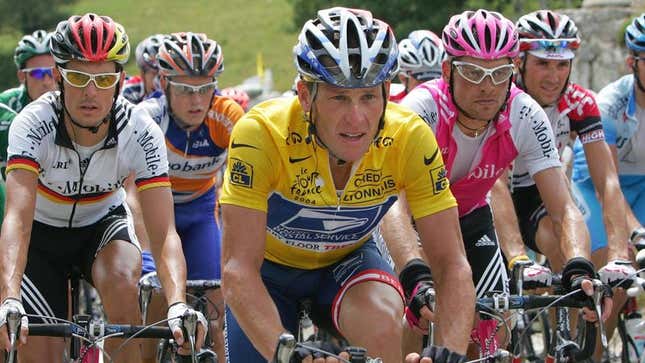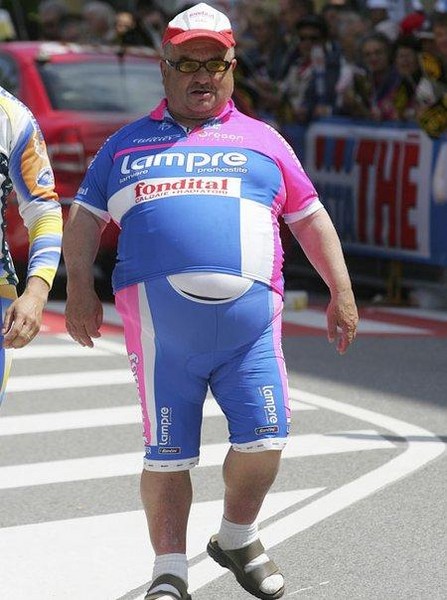"Doping is the administration to a normal subject in any possible way of a foreign agent or abnormal quantities of physiological substances with the sole purpose of increasing artificially and in an unfair manner the performance of the subject participating in a contest."
The first pedal bike was invented around 1864 and the first bicycle race in 1868, the Parc de St. Cloud to Paris, 1,200 kilometers. It was won by an Englishman, James Moore on a wooden bike withe iron wheels. By the early 1890's cyclists were already taking cocaine, caffeine, strychnine and chloroform to help them win a race by any means necessary. Some even murdered their rivals along the way...
 en.wikipedia.org
en.wikipedia.org
The first pedal bike was invented around 1864 and the first bicycle race in 1868, the Parc de St. Cloud to Paris, 1,200 kilometers. It was won by an Englishman, James Moore on a wooden bike withe iron wheels. By the early 1890's cyclists were already taking cocaine, caffeine, strychnine and chloroform to help them win a race by any means necessary. Some even murdered their rivals along the way...
1897
- Choppy Warburton of Haslingden, England died aged 52. He was described by the Lancashire Family History Society:
"Choppy has been firmly identified as the instigator of drug-taking in the sport [cycling] in the 19th century."[12]
1911
- Paul Duboc of France was doped or poisoned during the Tour de France. He was favourite but collapsed in a ditch in the Pyrenees after drinking from a spiked or poisoned bottle, allegedly given by a rival team manager. He finished in second place.
1924
- Henri Pélissier, Francis Pélissier, and Charles Pélissier of France – In 1924, following their abandoning of the Tour de France, the first real drug scandal arose when the Pélissier brothers gave an extraordinary interview to journalist Albert Londres. They said that they used strychnine, cocaine, chloroform, aspirin, "horse ointment" and other drugs to keep going.
1930
The acceptance of drug-taking in the Tour de France was so complete by 1930 that the rule book, distributed by Henri Desgrange, reminded riders that drugs would not be provided by the organisers.1949
- Fausto Coppi of Italy admitted in a television interview in 1952 that he used 'la Bomba' as there was no alternative if you wanted to remain competitive. This referred to amphetamines, which had been developed for military use during World War II to keep aircrew, merchant seamen and submariners awake, alert and energetic. After the war they found a ready market among endurance sportsmen.[18] Coppi also said, "One day I will take the wrong pill and pedal backward."[21] He also joked on camera that he only took drugs when absolutely necessary, which is nearly always.
1956
- Following the 14th Stage of the 1956 Tour de France, the entire Belgian team went down with a mystery illness. It was officially attributed to their having eaten 'bad fish' at dinner, an excuse also used in 1962 and 1991.[18]
1958
- Roger Rivière of France admitted, after his career was finished, to having taken "amphetamines and solucamphre" during his hour record of 1958—including taking tablets during the attempt.[27]
1959
- Charly Gaul from Luxembourg was implicated in July when French customs confiscated pills that were destined for him
1960
- Knud Enemark Jensen of Denmark participated in the 1960 Summer Olympic Games in Rome riding under the influence of amphetamines; he collapsed during the 100 km team time trial during the Games, fracturing his skull, and in a nearby Rome hospital shortly thereafter, he was pronounced dead. The autopsy showed he had taken amphetamine and another drug, Ronicol (Ronicol Retard) (nicotinyl alcohol tartrate), a direct-acting peripheral vasodilator that causes flushing and may decrease blood pressure.[29] (He was also reported as swallowing 8 pills of phenylisopropylamine, 15 pills of amphetamine and coffee.[1]) The chairman of the Dutch cycling federation, Piet van Dijk, said of Rome that "dope - whole cartloads -[were] used in such royal quantities."[30][31] Jensen's death led to pressure on the International Olympic Committee, which studied a report on doping drawn up by doctors demanding dope controls.
- Gastone Nencini of Italy was discovered by Tour de France doctor Pierre Dumas in his bedroom with plastic tubes running from each arm to a bottle of hormones;[32] retransfusion was a legal practice at the time.[33] In the 1930s, Scandinavian runners were believed to have used retransfusion to increase the number of corpuscles that carry oxygen to the muscles. In 1972, Dr Björn Ekblom of the Sport and Gymnastics Institute in Stockholm found that retransfusing cells increased oxygen uptake by nine per cent and athletic potential by 23 per cent.
- Roger Rivière of France admitted that his career-ending crash in the 1960 Tour de France was probably attributable to using Palfium (Dextromoramide), a painkiller that affects reflexes and judgment, during the descent of the Col de Perjuret on Mont Aigoual.[27] Palfium was used to deaden pain in leg muscles where it was directly injected (sometimes while riding). It was suggested that it had so numbed Rivière's fingers that he could not feel the brake levers.[18] He said he had an injection of solucamphor and amphetamine before the start and swallowed several amphetamine tablets.[34] He said he was an addict who downed thousands of pills a year.







